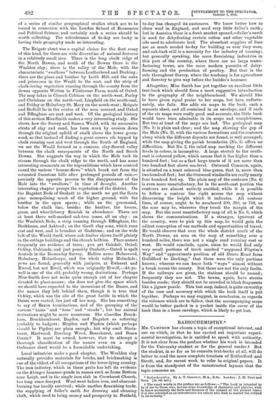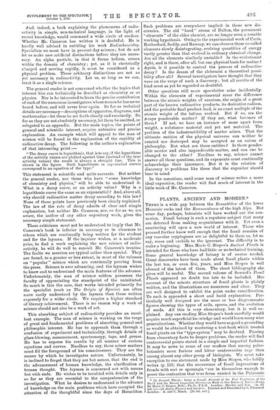RADIOCHEMISTRY.*
Mn. CAMERON has chosen a topic of exceptional interest, and one on which, in that he has carried out important experi- mental investigation, he is entitled to speak with authority. It is not clear from the preface whether his work is intended for the University student or for the general reader.' But the student, in so far as be consults text-books at all, will do better to read the more complete treatises of Rutherford and Strutt, and, for recent work, to refer to original papers. It is from the standpoint of the uninstructed layman that the topic concerns us.
• Radiochemistry. By A. T. Cameron, M.A., B.Sc. London J. M. Dent and Sons. (9.s. 6d. net.] I. The exact words in the preface are as follows :—" The book is intended to be of use to those who, having some knowledge of chemistry and physics, wish . to know accurately the facts and theories of the subject at the present time ; it is also intended as an introduction for others who wish to master the subject in its entirety." And, indeed, a book explaining the phenomena of radio- activity in simple, non-technical language, in the light of recent knowledge, would command a wide circle of readers.
Whether• Mr. Cameron has written it is doubtful. He is hardly well advised in entitling his work Radiochemistry.
Specialism we must have in present-day science ; but do not let us make new artificial distinctions before they are neces- sary. An alpha particle, in that it forms helium, comes within the domain of chemistry ; yet, as it is electrically charged and moving rapidly, it must be considered as a physical problem. These arbitrary distinctions are not as yet necessary in radioactivity. Let us, so long as we can, treat it as a single science.
The general reader is not concerned whether the topics that interest him can technically be described as chemistry or as physics. Nor is he interested to learn the precise contribution of each of the numerous investigators whose names he has never beard before, and will never hear again. So far as technical details are necessary—descriptions of apparatus, diagrams, and mathematics—let them be set forth clearly and succinctly. So far as they are not absolutely necessary, let them be omitted, or relegated to an appendix. But the main topics, the points of general and scientific interest, require extensive and precise explanation. An example which will appeal to the man of science will be found in the explanation of the rapidity of radioactive decay. The following is the author's explanation of that interesting point :—
"The decay curve is logarithmic, that is to say, if the logarithms of the activity values are plotted against time (instead of the true activity values) the result is always a straight line. This is shown in the figure. Such logarithmic or exponentiai curves correspond to an equation of the type."
This statement is scientific and quite accurate. But neither the general reader, nor those who have " some knowledge of chemistry and physics," will be able to understand it.
What is a decay curve, or an activity value ? Why is a logarithmic curve the same as an exponential ? And, above all, why should radioactive matter decay according to this law ?
None of these points have previously been clearly explained. The law of the rate of decay admits of clear• and simple explanation, but neither Mr•. Cameron, nor, so far as we are aware, the author of any other expository work, gives the necessary simple statement.
These criticisms must not be understood to imply that Mr. Cameron's book is inferior in accuracy or in clearness to others which are continually being written for the student and for the layman. If the inquirer wishes, at a moderate price, to find a work explaining the new science of radio- activity, he will do well to consult Mr. Cameron's treatise. The faults we mention are typical rather than special. They are found, to a greater or less extent, in most of the volumes on " popular " science which are continually pouring from the press. Science is ever advancing, and the layman wishes to know and to understand the main features of the advance.
Unfortunately, the man of science seldom possesses the faculty of appreciating the standpoint of the uninitiated. So much is this the case, that works intended primarily for the specialist (such as The Origin of Species) are often more easily understood by the layman than those written expressly for a wider circle. We require a higher standard of literary achievement. There is no reason why a work of science should not also be a work of ar•t.
This absorbing subject of radioactivity provides an excel- lent example. The man of science is working on the verge of great and fundamental problems of absorbing general and philosophic interest. He has to approach them through a confusion of experiment and technicality, through details of glass-blowing, measurement, spectroscopy, taps, and grease.
He has to express his results by all manner of curious equations and curves. Needless to say, these minor matters must fill the foreground of his consciousness. They are the means by which he investigates nature. Unfortunately, he is inclined to forget that they are but means, that the end is the advancement of human knowledge, the clarification of human thought. The layman is concerned not with means but with ends. He wishes to be troubled with details only in so far as they are essential to the comprehension of the investigation. What he desires to understand is the advance of knowledge on the main problems which have occupied the attention of the thoughtful since the days of Heraclitus. Such problems are everywhere implicit in these new dis- coveries. The old " hard " atoms of Dalton, the permanent " elements " of the older chemist, are no longer• even a tenable working hypothesis. Owing to the experimental work of Curie, Rutherford, Soddy, and Ramsay, we can observe these so-called elements slowly disintegrating, evolving quantities of energy vastly greater than that evolved in ordinary chemical change. Are all the elements similarly unstable ? Is the evolutionist right, and is there, after all, but one physical basis for matter ? Again, is it possible to control the process of radioactive decay ? Is the dream of the alchemist a theoretical possi- bility after all ? Several investigators have thought that they were on the verge of such a discovery ; but all results of the kind must as yet be regarded as doubtful.
Other• questions still more speculative arise incidentally. Within the elements of experimental error the difference between the atomic weights of uranium, the origin of a great part of the known radioactive products, its derivative radium, and the probable final product lead, is an exact multiple of the atomic weight of the helium evolved. But if so, ar•e the I3-rays ponderable matter? If they are, what becomes of them If not, we have an instance of mass apart from weight, a substance material and yet not material. The problem of the indestructibility of matter arises. That the ultimate entities of the physical universe can neither be created nor destroyed may be accepted as an axiom of philosophy. But what are these entities ? Is there ponder- able matter and also imponderable matter, and can one be changed to the other ? Needless to say, science cannot answer all these questions, and its exponents must continually acknowledge their ignorance. But it is the relation of discovery to problems like these that the expositor should bear in mind.
In the meantime, until some man of science writes a more ideal exposition, the reader will find much of interest in the little work of Mr. Cameron.



























































 Previous page
Previous page